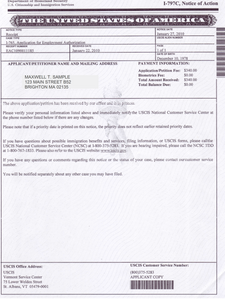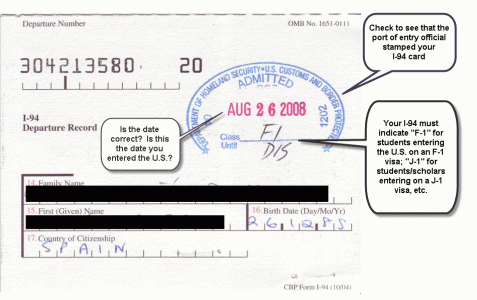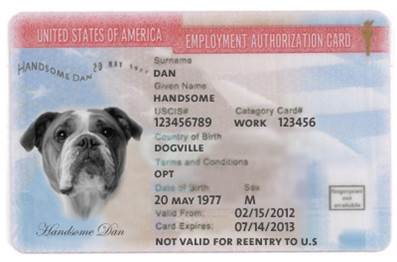Your Immigration Documents
While you are studying or working in the U.S., you should keep your immigration documents safe and valid. It’s also important that you understand the purpose of, and validity period for, each document.
Passport
Your passport is an important document issued by your country of citizenship and used to establish your identity. In any correspondence with ISSO and in your BU records and other applications, you should use the name as it appears on your passport. If the information in your passport is not accurate, you must correct it before any other immigration documents are changed.
Validity/Expiration
Maintaining a valid passport is an important part of maintaining your immigration status in the U.S. We recommend that your passport be valid for as long as possible into the future, but at the minimum, it should always be valid at least six months beyond any anticipated date(s) of entry to the US.
Renewal
If your passport is expiring while you are in the U.S., you will need to take the necessary steps to replace it in a timely manner. You can carry out this process in the U.S. by contacting one of your country’s embassies or consulates, or by returning home and renewing it there. The process for renewal will vary depending on your country of citizenship. In some cases, it may be as simple as a trip to your consulate in Boston, but in other cases it may be a more complicated and time-consuming process involving an embassy in Washington, DC, or a consulate in another city.
Corrections
The ISSO needs to use your name, as represented on your passport, on all of your immigration documents. If your passport name is not accurate, you must correct it before any other immigration documents are changed.
Visa
Your visa, or “visa foil,” indicates whether you have permission to seek permission to enter the U.S. in a certain immigration classification. You may have more than one valid visa in your passport, but you can only have one status while you are in the U.S. Therefore, your visa just supports entry to the US and does not confirm your current visa classification or how long you can stay in the U.S.
Once you are in the U.S., be sure to keep track of your entry visa’s expiration date as it may not coincide with the dates on your other immigration documents. If you plan to travel outside the U.S., you will need a valid visa in order to re-enter. (It may be helpful to consider your visa as you would a movie ticket: You need it to get into the movie theater, but once you are in the theater, you don’t need it—unless you exit for some popcorn or snacks. Then if you want to get back in the theater, you need to present that ticket again.)
Canadian citizens are exempt from U.S. visa requirements and thus do not need to obtain a visa foil from a U.S. embassy or consulate in Canada before entering the U.S. However, Canadians do need to obtain other status-specific documents and apply for the proper status when they pass through Customs.
Expiration & Renewal
If your visa expires when you’re in the U.S., you don’t need to take any action until the next time you depart the U.S.—then, in most cases, you’ll need to obtain a new, valid visa to re-enter.
You cannot renew an expired visa from within the U.S., so if you are leaving the US temporarily and your visa is expired, you must make arrangements to obtain a new visa at a U.S. consulate or embassy outside the U.S. Visit our Travel & Visas section for more information.
Some limited travel abroad may be possible with an expired visa. Please review the information on automatic visa revalidation.
Visa Revocations
On rare occasion, the US Department of State may decide to revoke a particular visa due to a criminal arrest or conviction. If so, they generally email the visa holder directly, but they do NOT notify the visa sponsor or the school. Only the U.S. embassy or consulate that issued your visa can confirm its status or validity. Once a visa is revoked, you must obtain a new one before re-entering the U.S. However, visa revocations usually indicate that a new visa may be challenging. You should consult an experienced immigration attorney or legal aid clinic if you visa is revoked and contact your ISSO advisor for guidance.
Immigration Documents Issued by BU or USCIS
Form I-20 or DS-2019 (for individuals in F or J status)
Your Form I-20 or DS-2019 gives a more detailed explanation of your program or affiliation at BU. The ISSO will issue this document for you through a system called SEVIS. If any terms of your program at BU change, the ISSO will need to issue you a new form to indicate those changes. The examples below outline the specific information to be included on your immigration document.
The dates indicated on your BU-issued document reflect the dates of your current program or affiliation. If you will be extending your program at BU, the ISSO will issue a new document to reflect the extended dates of your program or affiliation.
Form I-797 Approval Notice (for H-1B and O-1)
The I-797 form verifies your eligibility for either the H-1B or O-1 immigration classification. It includes your approved classification, the dates of eligibility for that classification, and the employer who has filed the petition with USCIS on your behalf (which should be BU). If any terms of your appointment at BU change, an amended H-1B petition may be required, so check with the ISSO in advance of making any substantive changes to your position.
If you will be extending your employment at BU, the ISSO will prepare and submit a new H-1B petition on your behalf.
Employment Authorization Document (EAD)
If your immigration status allows it, you can apply for an EAD that you can use as proof that you are eligible to be employed in the U.S. (at BU or elsewhere). The card will indicate the basis for your EAD approval (e.g., F-1 OPT, J-2 dependent, etc.), as well as the dates for which you are employable.
If you will be extending your studies or employment at BU, in most cases you will need to apply for a new EAD (if eligible) and obtain the new document prior to the end date of your current EAD.
U.S. Entry Stamp in Passport or I-94 Form
 Upon arrival to the U.S., a customs officer will review your passport, visa, and immigration-specific document(s), and grant you entry to the U.S. The customs official will place an entry stamp in your passport which indicates your date of entry, category of admission (i.e., J-1, F-1, etc.), and length of permitted stay in the U.S.
Upon arrival to the U.S., a customs officer will review your passport, visa, and immigration-specific document(s), and grant you entry to the U.S. The customs official will place an entry stamp in your passport which indicates your date of entry, category of admission (i.e., J-1, F-1, etc.), and length of permitted stay in the U.S.
If the entry stamp is not clear or not properly notated or if you need to apply for employment or other benefits from federal government agencies, you must present a Form I-94, which includes more detailed information about your most recent entry to the US. Get your I-94 form.
If you entered the U.S. prior to April 2013, entered the U.S. at a land border rather than an air or sea port, or changed to another immigration status while inside the U.S., you will have a paper I-94 card (small white card stapled in passport), which remains valid until you depart the U.S.
Entry Stamp by Status
- If you have entered in either the F or J immigration classification, your entry stamp should be marked with a “D/S” (duration of status) notation. This means that as long as you maintain that status, you may continue to remain lawfully in the U.S. as indicated on your BU-issued immigration document:
- Item #5 of your Form I-20, just after the phrase “and complete studies no later than”
or - Section 3 of your Form DS-2019, where it states the beginning and ending dates of your exchange program
- Item #5 of your Form I-20, just after the phrase “and complete studies no later than”
- If you entered in another immigration classification, your entry stamp will be noted with a future date. This means that so long as you are maintaining the terms of your immigration classification, you may continue to remain lawfully in the U.S. until the date indicated on your entry stamp.




